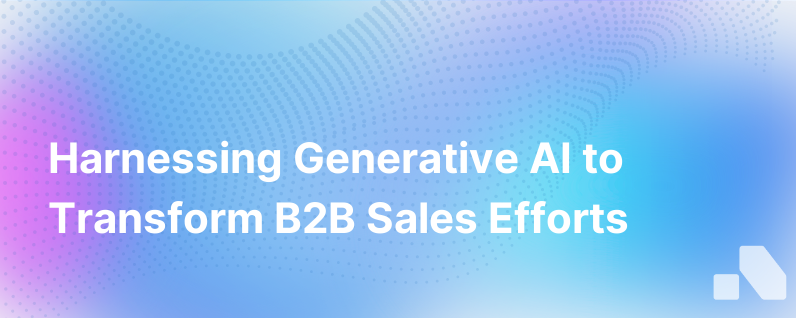Generative AI In B2B Sales
Published on January 3, 2024 by David Zhang
Artificial intelligence has emerged as a transformative force in B2B sales that's rapidly altering how companies engage with potential clients, develop leads, and close deals. The sudden rise of generative AI in particular has introduced unprecedented capacity for automation, personalization, and efficiency. However, few sales and business development teams actually know how to get the most value out of these cutting edge AI tools.
Generative AI refers to advanced AI technologies based on large language models (LLMs) that are capable of creating content – whether text, audio, images, or video – by learning from data patterns. This technology's application within B2B sales opens the floodgates for new strategic possibilities for sales teams eager to leverage their rich customer data to gain an edge in a fiercely competitive market.
Understanding Generative AI in Sales
Traditionally, sales relied heavily on the personal touch of sales representatives – from making phone calls to crafting bespoke emails. This process, while effective, can be painstakingly slow and labor-intensive. Generative AI streamlines this by automating content creation for sales pitches, email sequences, and even social media posts, all while maintaining a level of customization that speaks directly to the prospective customer's needs and challenges.
For example, a generative AI system can analyze a deployment of sales emails, learning which phrases, formats, and calls-to-action resonate best with certain demographics of decision-makers. Armed with this knowledge, the AI can generate tailored outreach materials that are more likely to get a response, all at a fraction of the time it would take a human SDR.
Components of Generative AI in B2B Sales
-
Personalized Content Creation: Sales tools powered by generative AI can produce personalized emails, presentations, and case studies that address specific client pain points, objectives, and industry jargon, ensuring that each communication feels personally crafted for the recipient.
-
Enhanced Data Analysis: Generative AI algorithms aren't limited to written content creation alone. They can also sift through mountains of data to uncover insights into buying patterns, customer sentiment, and market trends, allowing sales strategies to be continuously refined and targeted.
-
Lead Qualification and Prioritization: AI-driven systems can use both structured and unstructured data to evaluate and score leads using various criteria, allowing sales reps to focus their efforts on prospects with the highest potential for conversion.
-
Dynamic Sales Playbooks: Generative AI can create sales playbooks that respond to evolving circumstances, equipping sales teams with relevant messaging and strategy recommendations to navigate complex sales landscapes effectively.
-
Follow-up Automation: Even after initial outreach, AI can autonomously follow up with prospective clients through various channels, nurturing leads through the sales funnel without the need for constant human intervention.
The Advantages of Generative AI
The use of generative AI delivers significant advantages in sales efficiency and effectiveness:
-
Rise in Productivity: Repetitive tasks such as drafting emails or creating sales collateral are delegated to AI, freeing sales reps to engage in higher-value activities like establishing relationships or negotiating deals.
-
Improved Lead Targeting: Generative AI’s predictive models can more accurately target high-value accounts prone to conversion, ensuring that sales resources are not squandered on low-yield prospects.
-
Increased Sales Velocity: By quickly generating and optimizing outreach materials, sales cycles are shortened, leading to more rapid deal closings and increased revenue growth.
-
Data-Driven Decision Making: With AI's ability to process vast amounts of data, sales strategies become smarter and more data-informed, pivoting based on real-time analytics and customer feedback.
-
Heightened Personalization: AI's ability to tailor communications on a granular level to the individual client fosters a sense of one-to-one connection, critical in establishing trust and rapport in B2B sales.
Navigating the Challenges of Generative AI
Despite its benefits, generative AI is not without its challenges:
-
Quality Control and Oversight: The content generated by AI must be closely monitored for quality, brand consistency, and accuracy – it requires a human touch to ensure materials meet the company’s standards.
-
Data Privacy Concerns: Generative AI operates on large datasets, which may include sensitive customer information. Vigilant data stewardship and compliance with regulations like GDPR are paramount.
-
Integration Hurdles: Seamless integration with existing CRM and sales platforms may require a learning curve and significant change management efforts.
Future Outlook for Generative AI in B2B Sales
Looking ahead, the integration of generative AI into B2B sales processes is poised to grow more sophisticated. With fine-tuning in natural language processing and machine learning, these tools will generate even more accurate and compelling sales materials that resonate with clients. Additionally, as AI technology advances, we anticipate seeing these systems take on more complex tasks such as conducting initial prospecting calls or even managing entire sectors of the sales process autonomously.
At Aomni, we recognize the transformative potential of generative AI for B2B sales. We provide tools that harness real-time account research, competitive insights, and personalized sales content creation, all with minimal effort from your team. With Aomni, your sales strategy becomes more intelligent, efficient, and effective, equipping you to navigate the complexities of B2B sales with confidence and precision. Explore how our AI-driven solutions can redefine your sales process and uncover new growth opportunities for your business.